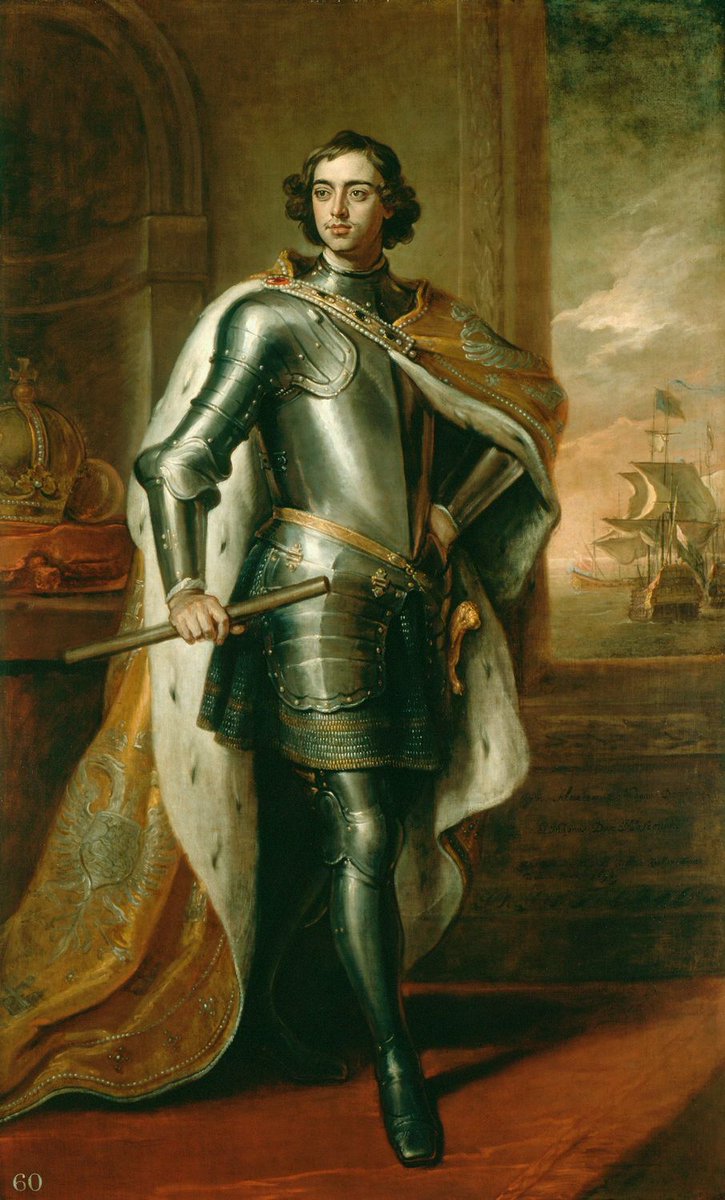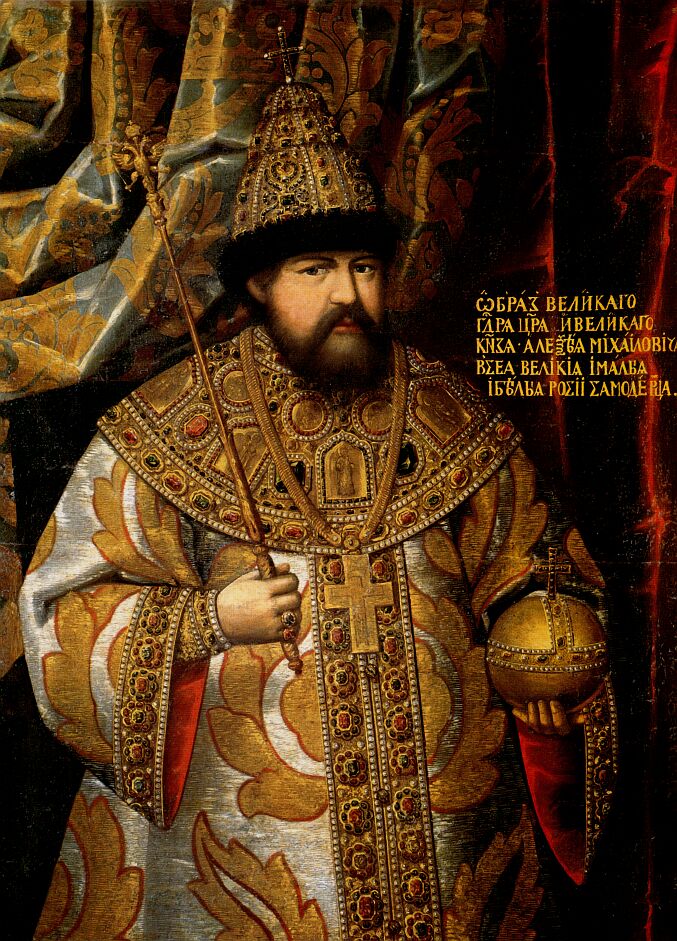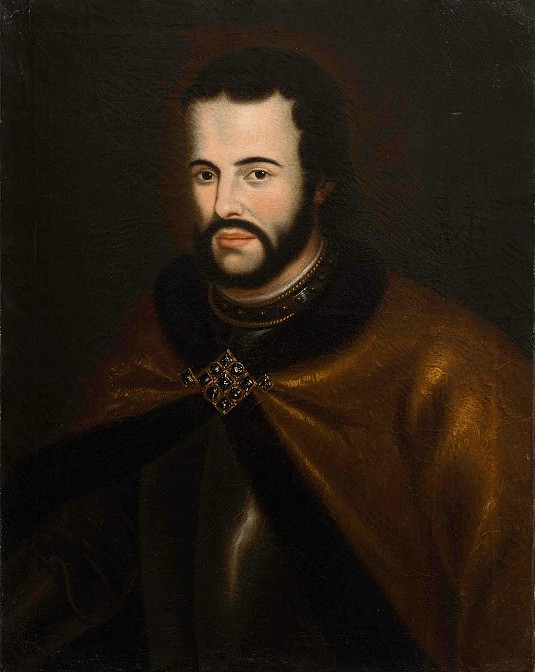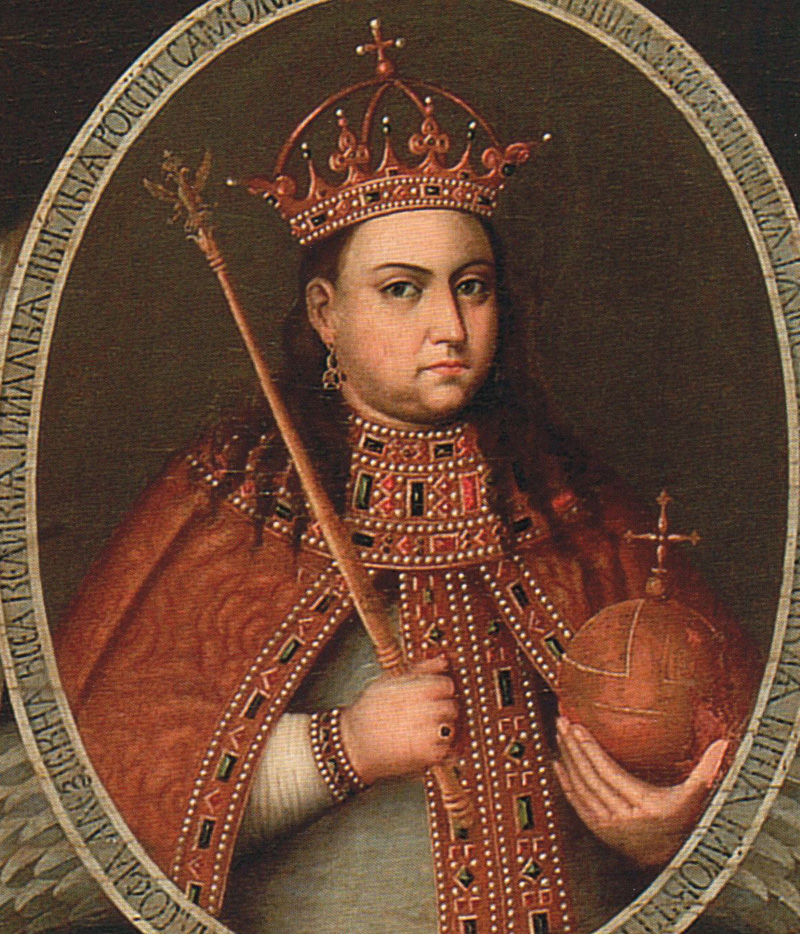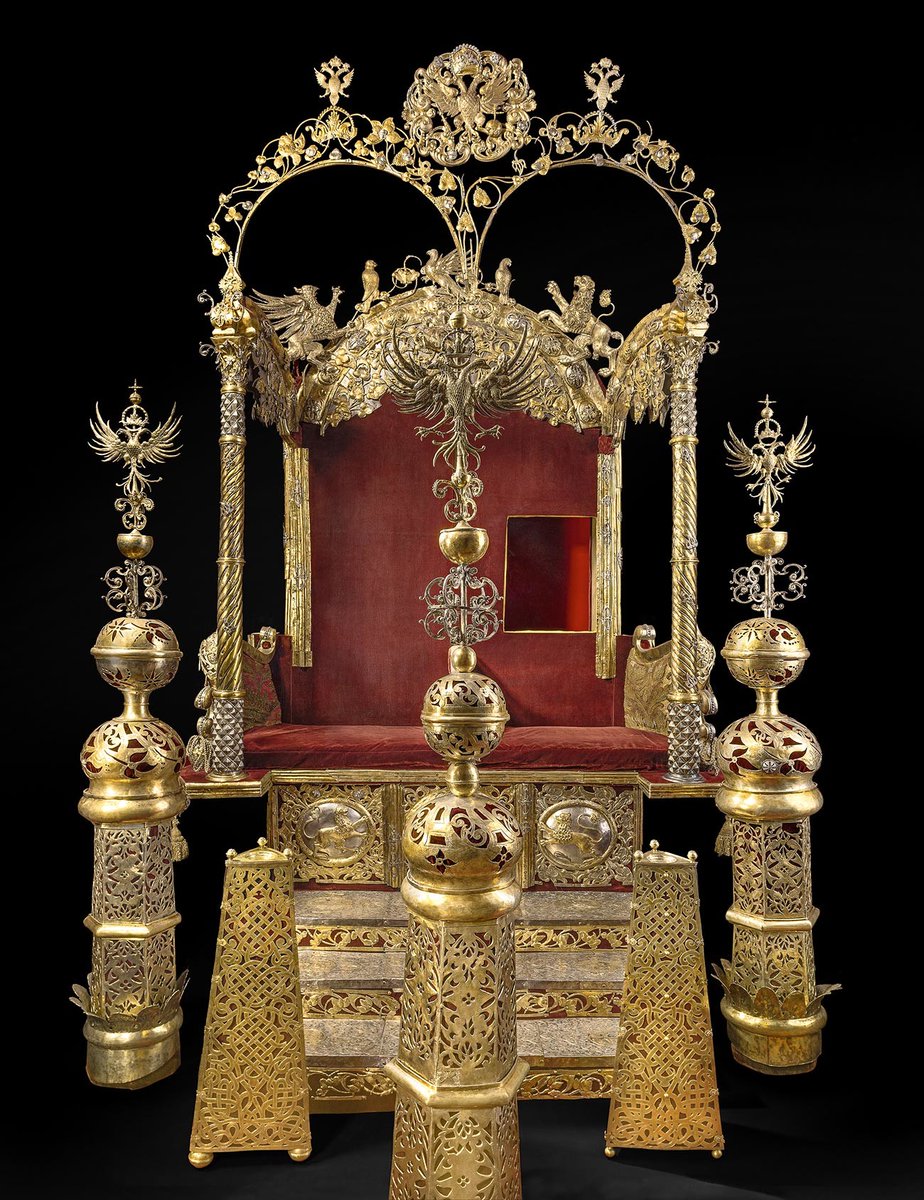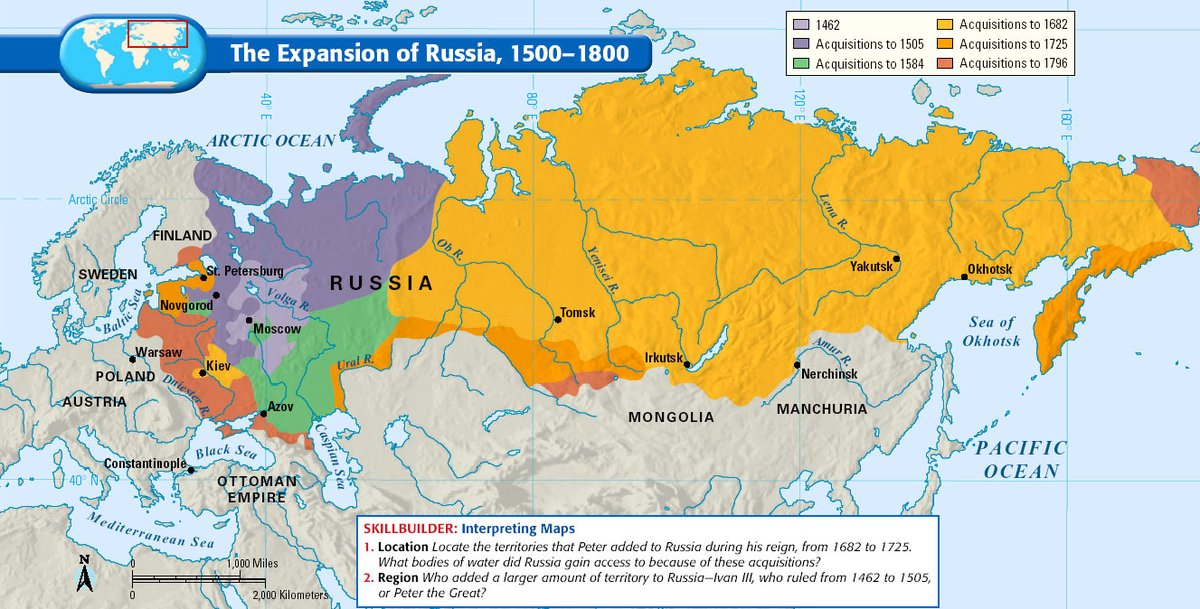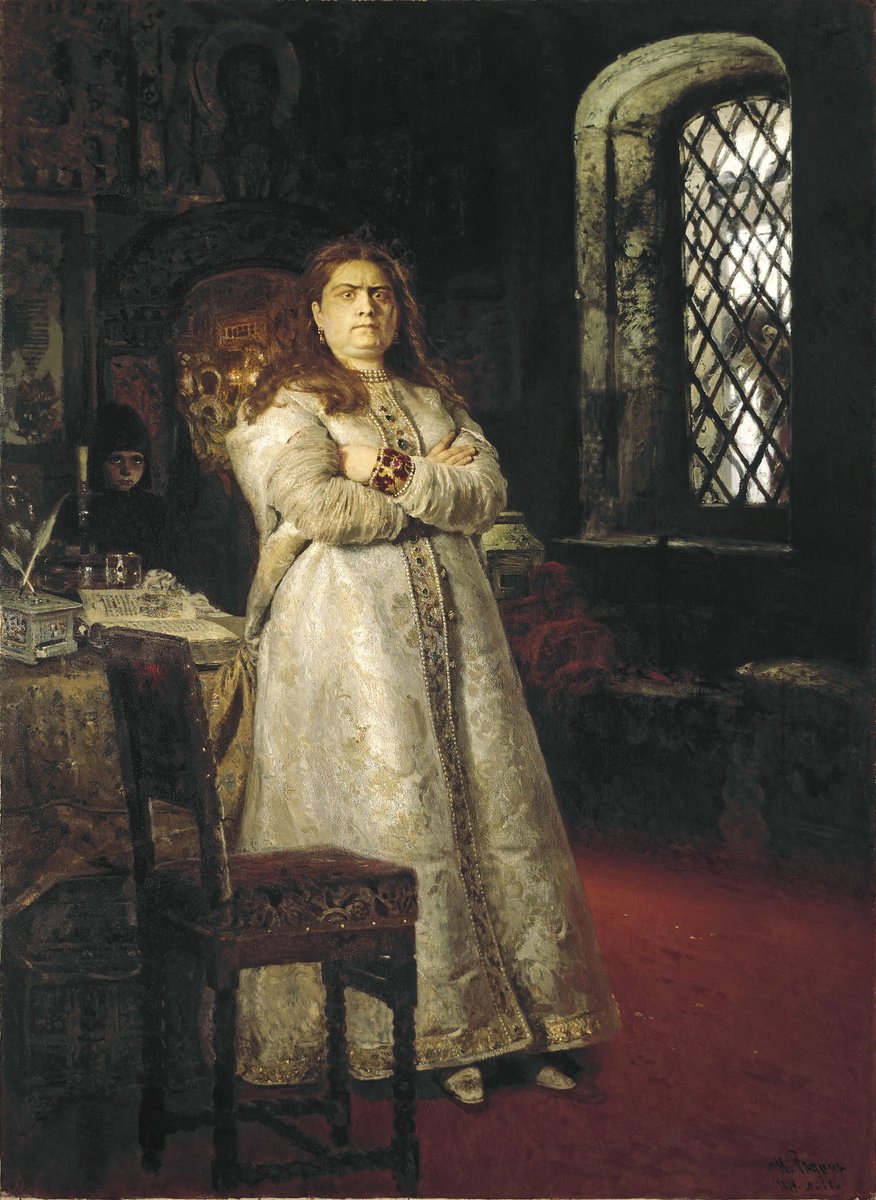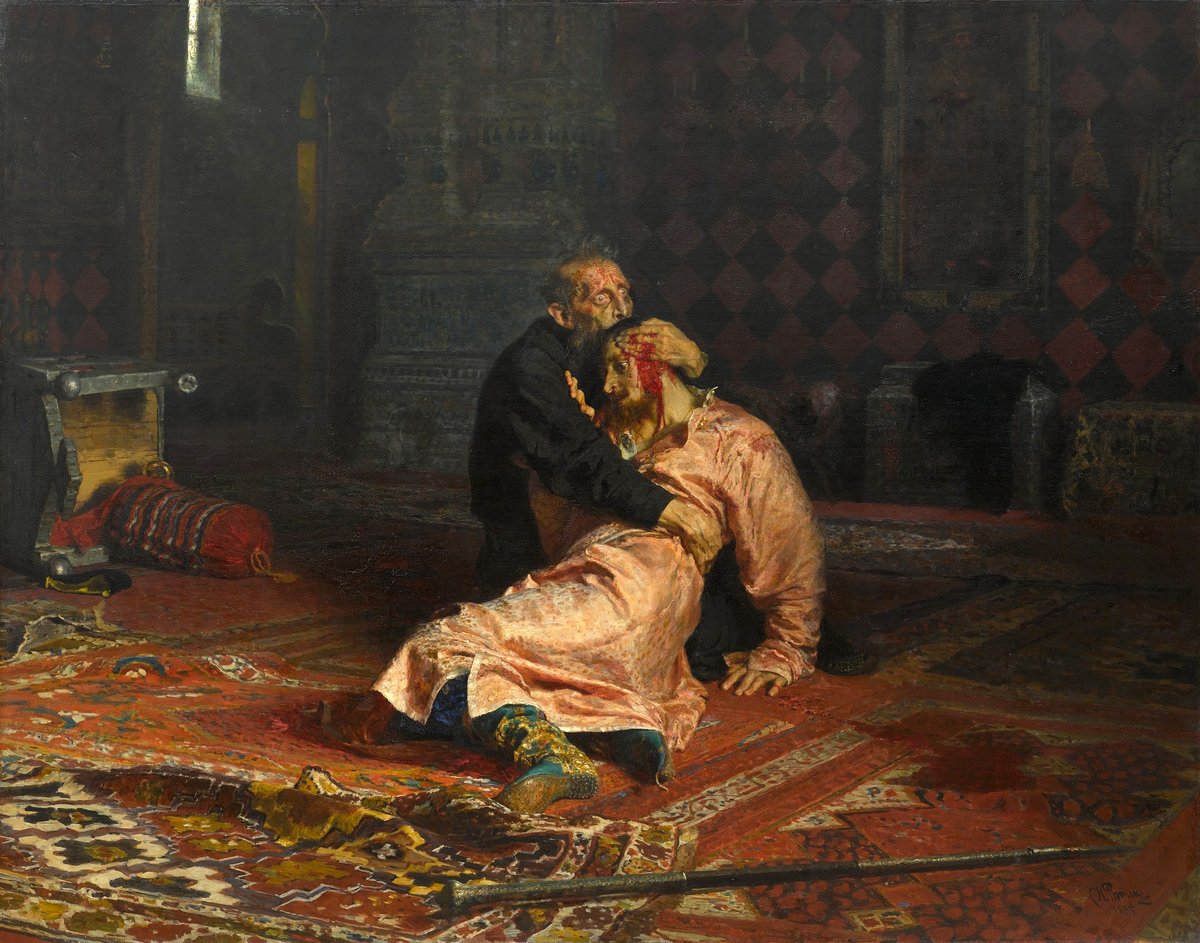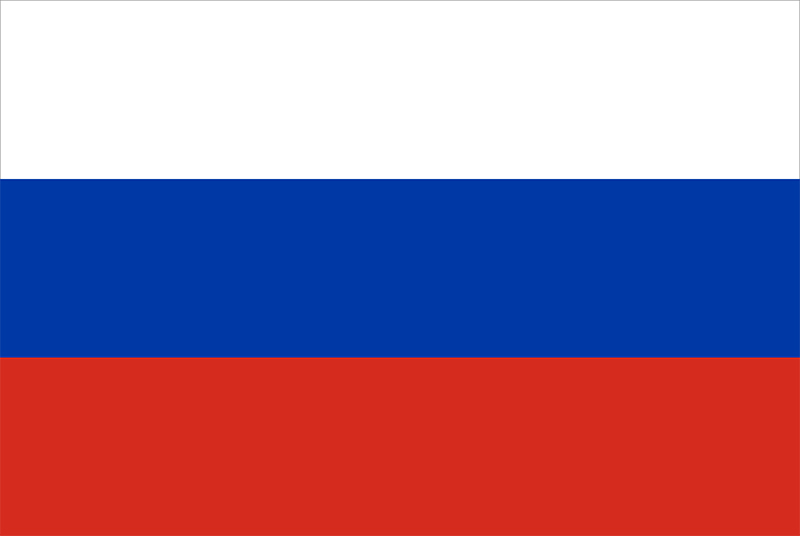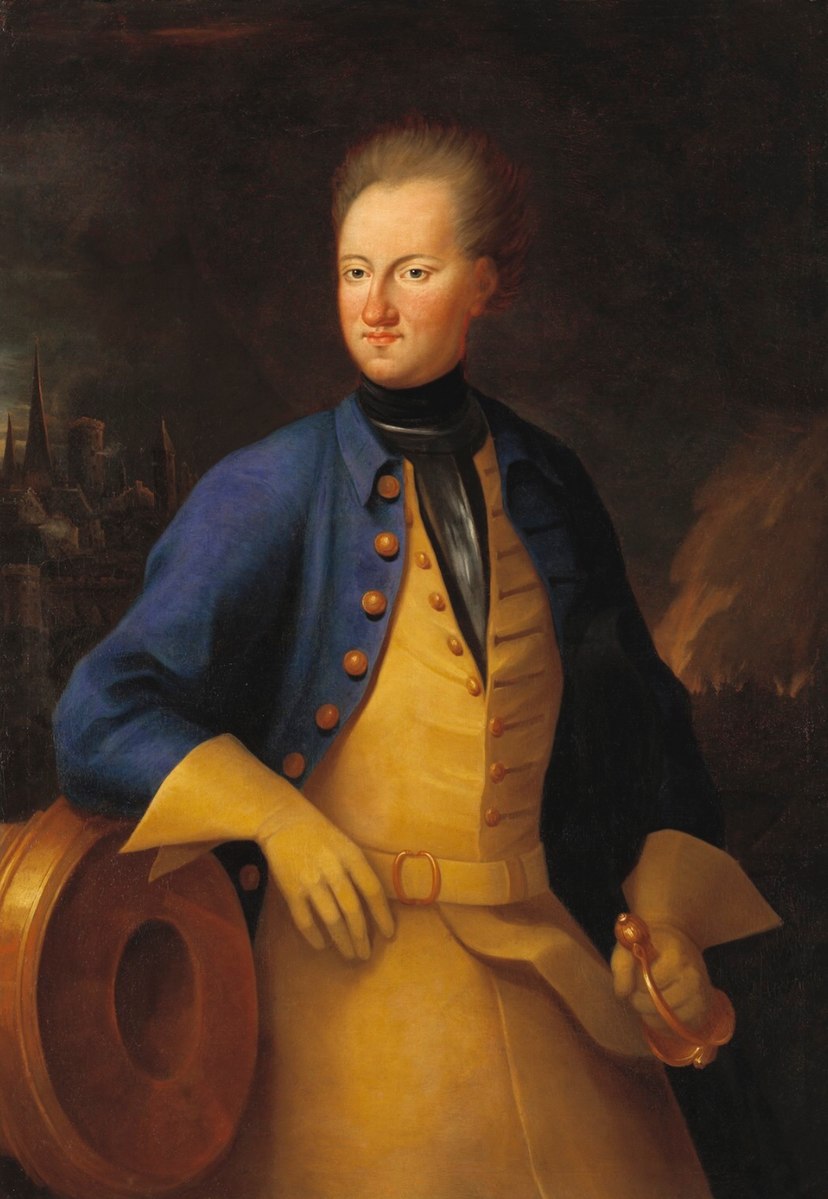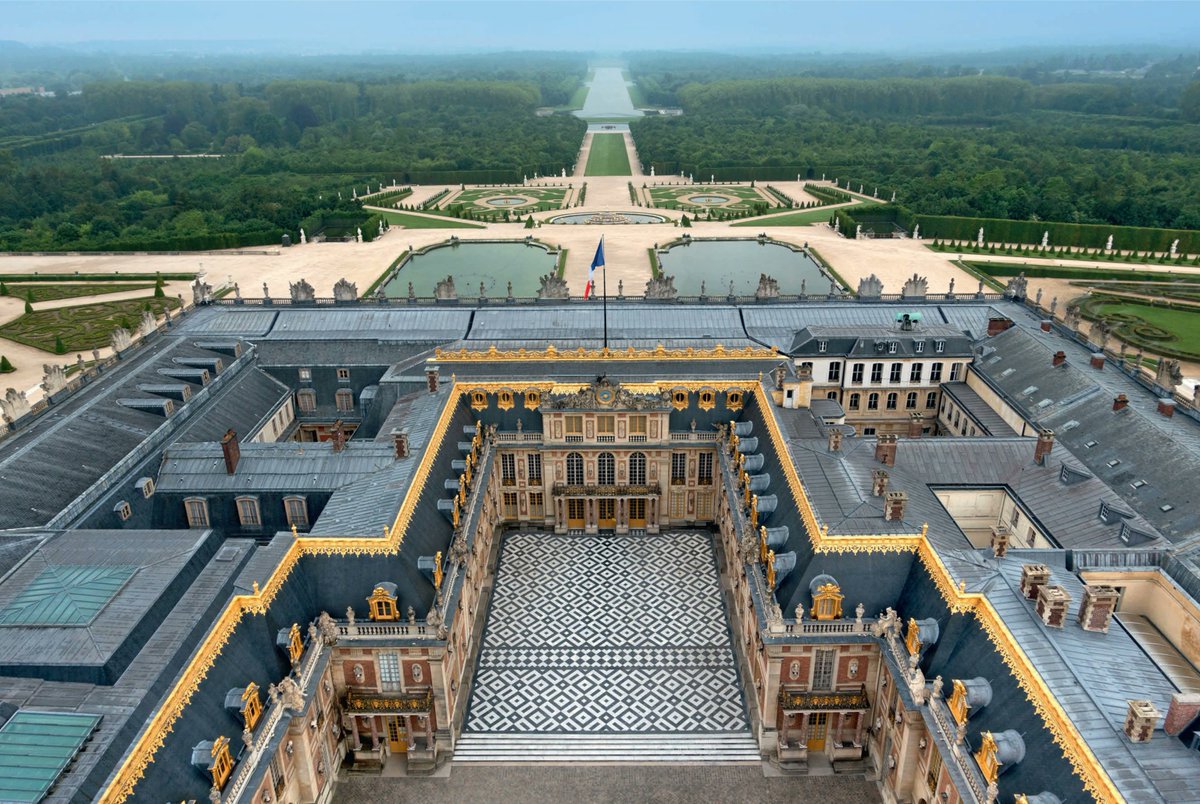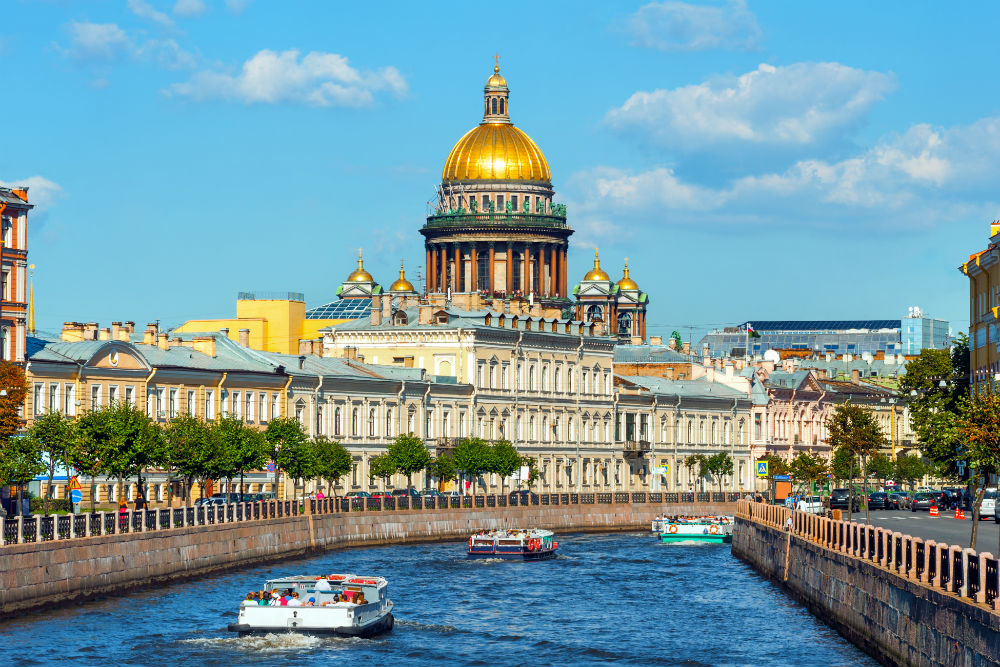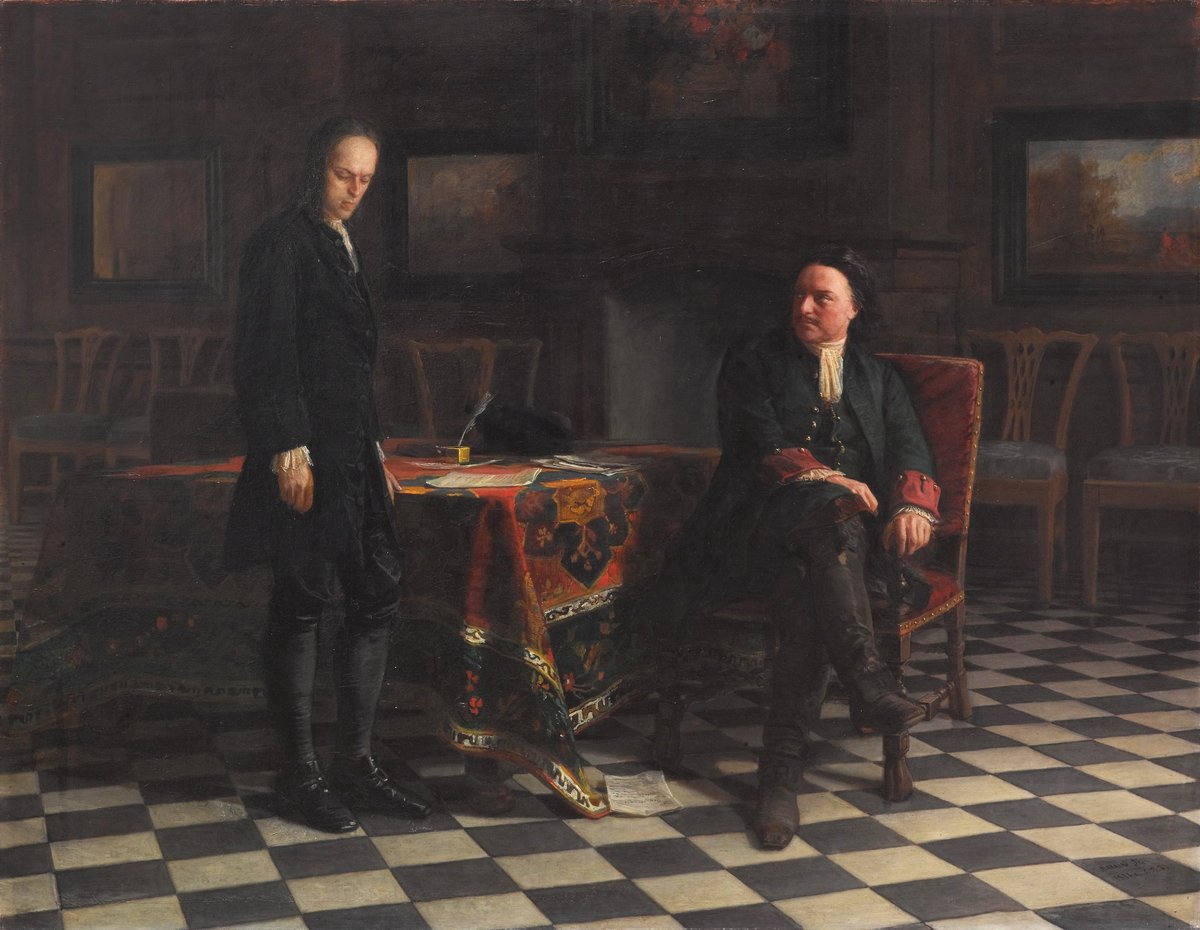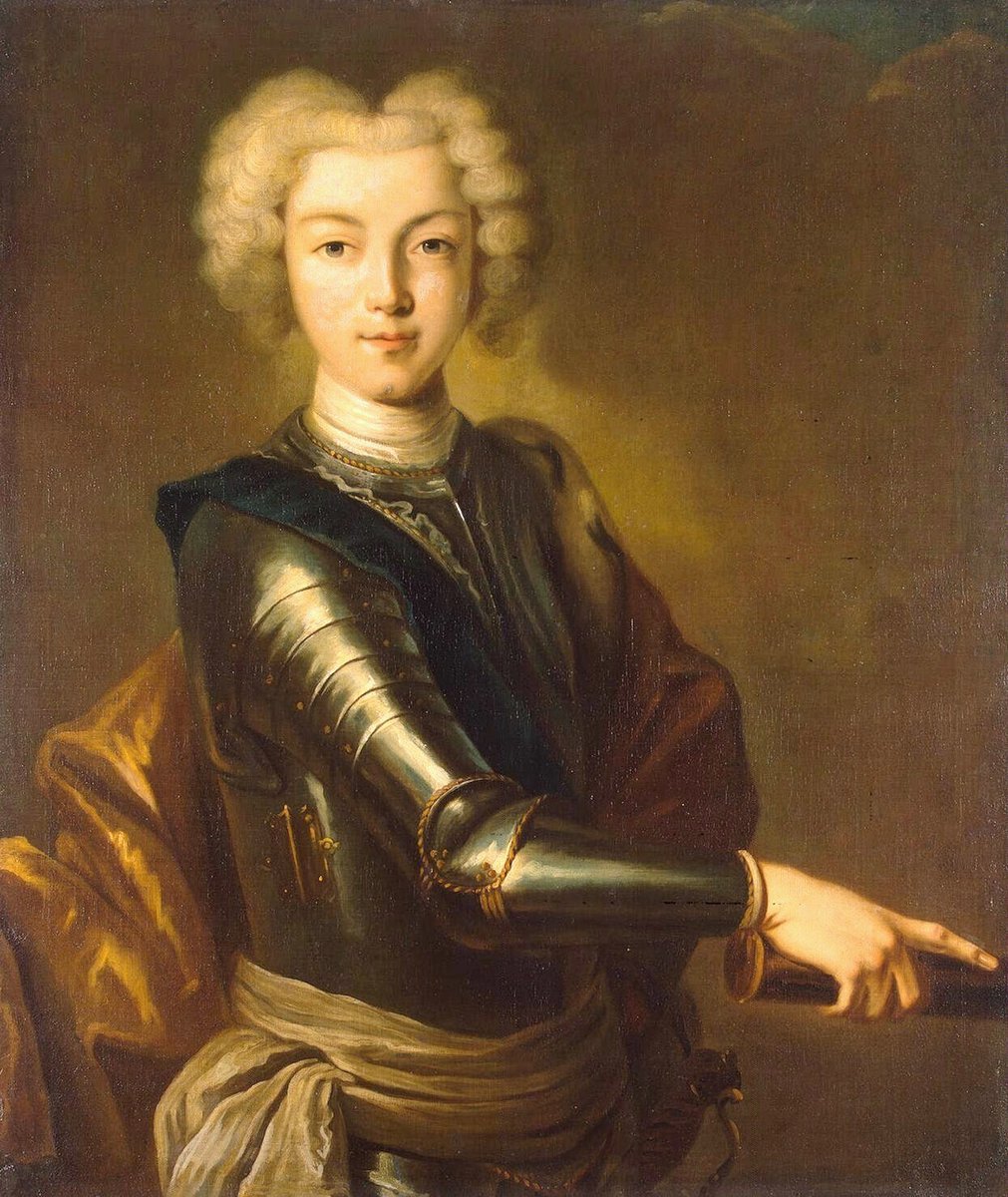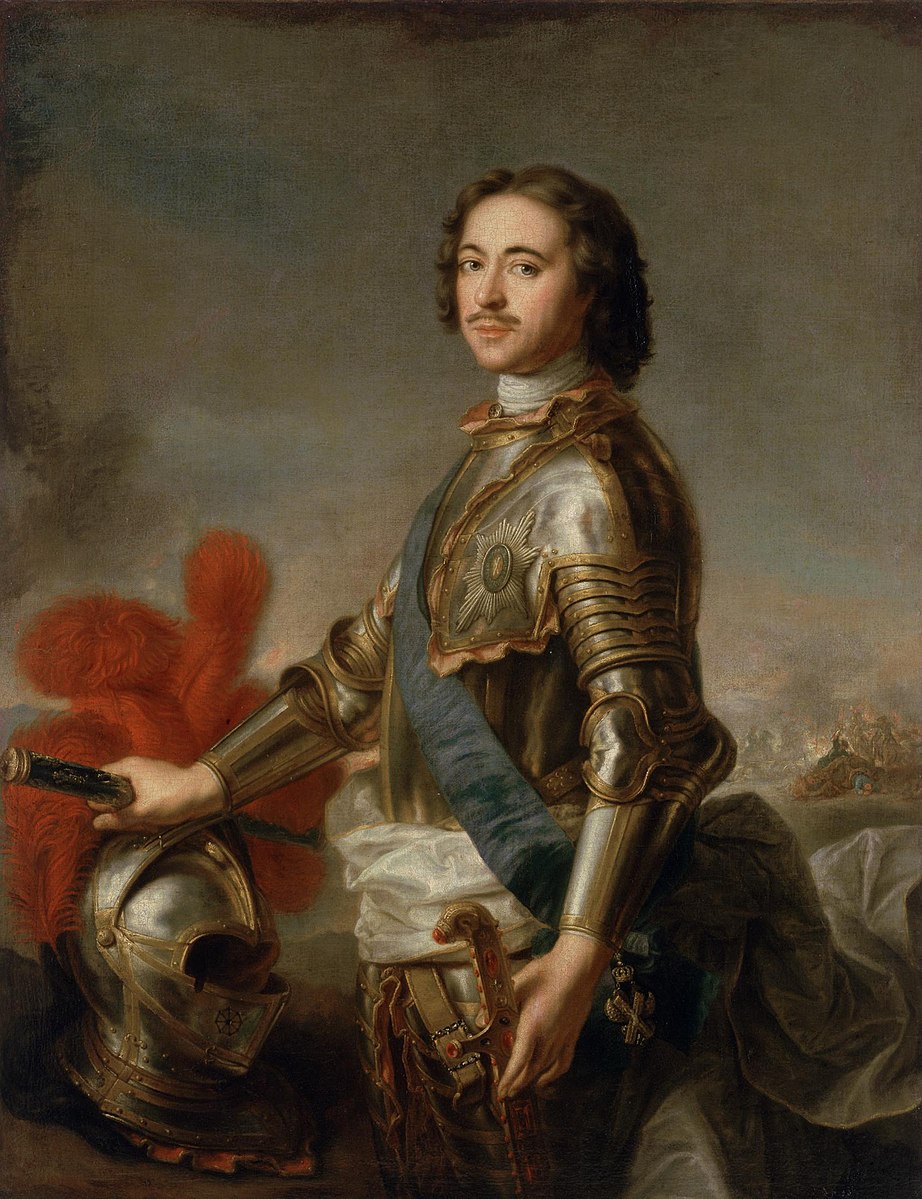This is #EuropeanBios entry #59, Peter the Great. A metaphorical and also literal giant of a man, standing 6& #39;8" (the European average at the time was a foot shorter), he totally revolutionized Russia through sheer force of will and also by being a total asshole most of the time.
Peter was, for better and worse, a man who acknowledged no limitations. The same mind that could formulate an intention and carry it through to the end without hesitation created Russia& #39;s second-biggest city, invented its navy from scratch, and also murdered his own son.
(If you& #39;ve noticed a jump in numbers: don& #39;t worry, you haven& #39;t missed any, I just fucked up the numbering... uhhh... several times. Queen Anne was 58, Maria Merian was called 54 but should have been 57. The full list is now at http://europeanbios.com"> http://europeanbios.com )
But we must start at the beginning. Peter was born in 1672 to Tsar Alexis of Russia. Alexis died when Peter was 4, leaving Peter& #39;s half-brother Feodor, then 15 years old, in charge. Feodor was described as "sickly" and died only 6 years later, creating a crisis of succession.
Next in line to the throne was another half-brother, Ivan, aged 16. Ivan was mentally under-developed and physically even less well. He was widely regarded as incapable of ruling and was vocal about not wanting the job anyway, but Ivan& #39;s side of the family wanted power.
Ivan& #39;s side of the family was led by his sister Sophia (likewise half-sister to Peter) who was a vocal, ambitious and capable power-broker. This was extremely unusual for a noble-born Russian woman at the time; they were usually kept literally out of sight and sound of men.
Sophia engineered a rebellion of the Streltsy, a sort of elite military corps in which membership was hereditary (so, not actually selected for being good at their jobs, or loyal). The Streltsy had been created a hundred years earlier by Ivan the Terrible: https://twitter.com/seldo/status/1396667820956520455">https://twitter.com/seldo/sta...
This rebellion got catastrophically out of hand. The Streltsy, fed misinformation by Sophia, invaded the royal palace. They killed hundreds of people, dragging them from their hiding places and throwing them over a balcony to be cut into pieces by their fellow soldiers below.
10 year old Ivan and his mother remained cowering in terror in their hiding place in the palace for days as their friends and relations were dragged screaming away. A triumphant Sophia installed Ivan as co-ruler with Peter. She became regent, wresting power from Peter& #39;s mom.
This traumatic event understandably shaped Peter forever. He hated the palace and all of Moscow. This is surprisingly similar to what happened to Louis XIV at a similar age, and Louis had a similar reaction: he hated Paris. https://twitter.com/seldo/status/1425848084085436427">https://twitter.com/seldo/sta...
Sophia ruled unchallenged for 7 years, literally the power behind the throne: Peter and Ivan would sit on the throne (made wide enough for two) and Sophia would sit behind them, listening through a hole cut in the back (right hand side) and telling Peter what to say.
While Sophia held power, Peter grew up. He had a truly wild childhood featuring almost no formal education, an unlimited budget, and a near total lack of adult supervision. He played soldiers with his friends by firing real, loaded cannons at each other and setting off fireworks.
Peter& #39;s soldier games got more and more realistic: they got uniforms, built real forts, and earned ranks and promotions through service. They grew larger and more serious until when Peter became an adult they were promoted from an astonishing plaything to real, loyal battalions.
Teenagers with live ammunition? They could get hurt! And indeed, they DID get hurt: they got shot with real bullets and died of real wounds. But the only person with the authority to tell Peter to stop was Sophia, and Peter dying would be convenient for her, so she didn& #39;t.
It was also during this time that Peter stumbled upon a boat for the first time. Russia at the time had no navy of any kind. To understand why, it& #39;s helpful to look at a map of how Russia grew: it started out landlocked (purple). The coastline it had was usually locked in ice.
So Russia didn& #39;t have a martime culture. Despite this, young Peter became obsessed with boats. He found foreign sailors and ship-builders and -- again, no budget, no supervision -- started building ships and sailing them around the nearest large lake, 40 miles away.
Despite almost no formal schooling, Peter was a tremendously practical learner: he learned how to build ships himself and continued to do so even after he became Tsar. He also learnt metalworking, pottery, even dentistry (his court would hide their ailments to avoid his "help").
After 7 years of rule Sophia over-extended herself and got into a war with the Tatars, by which we mean the remnants of the Mongolian empire started 600 years earlier by our friend Temüjin, better known as Genghis Khan. She lost, and it was expensive. https://twitter.com/seldo/status/1295138378719965184">https://twitter.com/seldo/sta...
Military losses weakened Sophia politically, allowing Peter, now 17, to summon loyalists and seize power in a (thankfully, this time bloodless) coup. He banished Sophia to a convent and his mother regained her position as regent, with Ivan still technically co-ruler with Peter.
Sophia comes off as rather the villain here but that is almost certainly sexist historians again. One king was incapable, the other a child, somebody had to run the place and by all accounts she did a pretty good job until being ousted by nobles who preferred a male tsar.
(This portrait of Sophia depicts her after she has lost power and is banished to the convent. Incidentally it is painted by the same artist who did this painting of Ivan the Terrible, his speciality apparently being painting The Eyes Of People Who Have Seen Some Shit)
The next phase of Peter& #39;s life, from ages 17 to 24, is sort of a super-powered frat boy. While his mother ran the country, he ditched responsibilities to go build boats, sail, and get extremely drunk with his friends in a building built and reserved exclusively for them to do so.
He continued to obsessively learn about boats and sailing from foreign sailors and shipwrights in Moscow. He visited Arkhangelsk, then Russia& #39;s only seaport, and even that was locked in ice half of every year. He became the first Russian Tsar to board an ocean-going vessel.
He became great friends with sailors who visited Arkhangelsk. They were mostly Dutch, and he admired them and learned to speak Dutch quite well. He created Russia& #39;s naval flag by copying the Dutch one (left) and rearranging the colors; it is today the Russian national flag.
In 1694 his mother died, and he at age 22 began to rule directly, though still technically sharing power with the increasingly sick Ivan, who died two years later in 1696. At this point Peter seems to have decided to start taking being Tsar seriously.
Peter still wanted to turn Russia into a naval power but was hindered by the major problem of having no access to the ocean six months out of the year. He first tried to gain access to the black sea, but was rebuffed by the Ottoman empire. He needed foreign allies.
To get them, he planned a "grand embassy", a 2 year long trip around Europe to persuade other nations to join his fight against the Ottomans. Along the way, he would also learn about European culture, technology, and military tactics to modernize Russia. The arrows are his route.
He did the trip "incognito", to avoid the massive expense and ceremony of a state visit, but this did not go well. When people knew it was him they thronged to see him, preventing him visiting ship building yards and other industrial venues where he was eager to learn techniques.
When they *didn& #39;t* know it was him it went even less well. The town of Riga in what was then Sweden (now Latvia) paid his entourage what he considered insufficient courtesy. He held a grudge, and a decade later during the Russian-Swedish war he burned the place to the ground.
He did eventually manage to live for several months undetected in Amsterdam, under an assumed name, learning shipbuilding, though he got into some trouble when some locals insulted him. He attempted to have them executed, but was told since he was incognito he couldn& #39;t do that.
He also visited London, hanging out with William of Orange, who had not yet been succeeded by our favorite lesbian Queen Anne ( https://twitter.com/seldo/status/1447580832344915971).">https://twitter.com/seldo/sta... True to his frat-boy past, he and his entourage completely trashed the house they stayed in, including burning the furniture.
He returned to Russia a changed man. Full of new knowledge and eager to reform and modernize, he forced hundreds of Russian men to leave the country to go and learn European techniques. He changed how Russians dressed, adopting European styles, and forced them to start shaving.
The shaving thing was particularly troublesome. Orthodox Russian religion was very clear that men should wear beards, so nobody wanted to do it. Peter started off by taxing beard wearers but eventually resorted to holding down beard-wearers and roughly shaving them himself.
At 17 Peter had been married in an arranged ceremony to a woman called Eudoxia that he did not give a shit about. After ignoring her for a decade, he callously divorced her by sending her to a convent (the Russian church allowed men to divorce up to 3 times in this way).
Her place was filled by Marta Skowrońska, a peasant woman who was initially his mistress. They married soon after his divorce. In the process, she converted to his religion and changed her name to Catherine: she would eventually become empress of Russia by that name.
Peter and Catherine had by all accounts an amazing relationship. They loved each other passionately and supported each other both politically and emotionally. She came with him on military campaigns. She was practical, like him, and never forgot or hid her humble origins.
Unable to make any headway against the Ottomans, Peter made peace with them and tried again to get access to the sea for Russia, this time by invading what was at the time Sweden. This war went on for years. Both sides set fire to the countryside and committed tons of war crimes.
Peter& #39;s opponent in the Russian-Swedish war was Charles 12, a similarly young and boisterous monarch who was very good at war and kept beating the shit out of Peter until Charles was accidentally wounded. Without his singularly effective leadership, his entire military collapsed.
All of Europe had until this point considered Russia kind of a joke. They were backwards, had a poor military reputation, and were far away. Peter& #39;s victory over Sweden changed all of that overnight: suddenly they were modern, apparently good at war, and right on the doorstep.
Peter took the territory captured from Sweden and built what is probably his crowning achievement: the city of St Petersburg (Peter and Petersburg are named after the same saint, the city isn& #39;t named after him). It remains one of the biggest cities in Europe.
The creation of St Petersburg was an awe-inspiring act. Created from nothing in the swampy delta of the Volga river, Peter moved the entire apparatus of governmental power to his new city and dragged all of its nobility along with it. Loving Amsterdam, he filled it with canals.
The creation of St Petersburg, a glittering alternate capital, has strong echoes of Louis XIV& #39;s creation of Versailles, and probably similar motivations: as mentioned earlier, Peter and Louis share a horrible childhood trauma in their original capitals and hated them after that.
It was at this point people started calling Peter "The Great". He had taken a useless hereditary military and created a world-beating army and navy, he had captured huge new territory, and Europe was paying attention to Russia at last. Russians were also delighted to end the war.
Of course, one does not create an entire city without labor, and Peter here used enormous quantities of forced labor. Some of these were Swedish prisoners of war, many were Russian serfs. The difference from slavery was mostly the name. Remember: kings are always assholes.
Using forced labor, locking his sister and his wife in convents, committing war crimes were big things. But Peter was also an asshole at the micro level: he had a terrible temper, and would erupt over minor offenses into violence, striking even close friends and associates.
But Peter& #39;s most awful act was yet to come: in 1718, his eldest child Alexei was suspected of being involved in a plot to overthrow Peter. Alexei was the child of his first wife, and related via her to old Russian nobility who did not like Peter and wanted to undo his reforms.
Alexei did not want to be Tsar and said so over and over. But Peter could not leave him hanging around, a threat to his power and legacy. So with unbelievable willpower and callousness, he had his son tried and tortured to confess conspiracy. Alexei died in prison after torture.
With no remaining male heirs, he crowned his wife Catherine empress. She survived him by only two years, however, and her successor was his grandson by Eudoxia, who became the short-lived Peter 2, who died only a few years after her.
Peter& #39;s legacy is enormous and recognized as such. He took a Russia that was hundreds of years behind and dragged it, kicking and screaming, into contemporary European culture. He created an entire city to his specifications. He took Russia from nothing to a naval power.
As an illustriation: compare Peter& #39;s portrait to that of his father& #39;s. Alexis is traditional, orthodox, part of a forgotten world. Peter is the very model of a contemporary European. The change in their portraits is the change he wrought in all of Russia in one generation.
But it really was "kicking and screaming". He did all the kicking, and thousands upon thousands of people did the screaming. They died in wars, in labor camps, and of poverty under the enormous taxes he levied to pay for his ambitions. Being Great and being good are not the same.
P.S. This didn& #39;t fit anywhere, but Peter& #39;s working habits are interesting given how productive he was. He would sleep six hours a night, and take a two-hour nap in the middle of the day. He also had a custom-made "standing desk", 5& #39;9" high, the oldest one I& #39;ve seen recorded.
P.P.S. The bio of Peter I read was excellent but written in 1981, so it suffers a particularly bad case of the "compare to things today" that biographers in my opinion should avoid. Endlessly comparing things in Russia in the 1700s to the USSR in 1981, it was two history books.
P.P.P.S. Another weird fact about Peter that didn& #39;t fit anywhere is: as a royal child he had a personal staff and they were all little people. As was common among royalty at the time, he kept little people on staff and treated them like pets. It was gross. https://twitter.com/seldo/status/1391607827987271682">https://twitter.com/seldo/sta...

 Read on Twitter
Read on Twitter